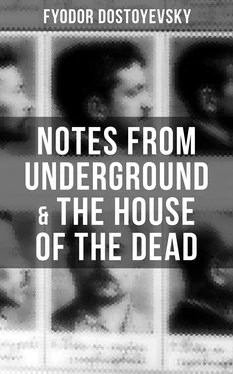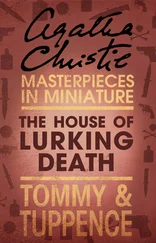While still a student, his evil ways had led to a quarrel with his parents. He went to St Petersburg and earned his living as a common informer, never hesitating to sell the blood of ten men in order to gratify his insatiable thirst for the grossest and most licentious pleasures. He was not without intelligence; but he gradually became so perverted in the taverns and brothels of St Petersburg that he finally took part in an affair which he knew must lead to disaster. He was condemned to exile and ten years’ hard labour in Siberia. One might have thought that such a frightful blow would have brought him to his senses, that it would have caused some reaction, some change of heart, and brought about a crisis; but he accepted his fate without the least concern. It did not frighten him; the only thing he disliked was the necessity of working and of abandoning for ever his evil life. The label of convict had no effect but to prepare him for new acts of baseness and more hideous villainies than any of which he had previously been guilty.
‘ I am now a convict, and can crawl at ease, without shame.’ That was the light in which he regarded his new condition. I think of this disgusting creature as of some monstrous! phenomenon. During the many years I lived with murderers, debauchees, and proved rascals, I never met a case of such complete moral abasement, determined corruption, and shameless wickedness. Among us there was a parricide of noble birth, to whom I have already alluded. Yet there was plenty of evidence that he was much better, far more humane than Af. During the whole term of my imprisonment, Af was never anything more in my eyes than a lump of flesh furnished with teeth and stomach, greedy for the most vile and bestial enjoyments, for the satisfaction of which he was prepared even to commit murder I do not exaggerate in the least. I recognized in him one of the most perfect specimens of animal passion, restrained by no principles, no rule. How his eternal smile disgusted me! He was a monster-a moral Quasimodo. At the same time he was intelligent, cunning, good-looking, had received some education, and possessed considerable ability. Fire, plague, famine, no matter what scourge, is preferable to the presence of such a man in human society. I have already said that espionage and denunciation flourished in prison as the natural product of degradation, without the convicts thinking much of it. On the contrary, they maintained friendly relations with A-f. They were more affable with him than with anyone
else. The favour shown towards him by our drunken friend, the governor, gave him a certain importance and even moral superiority in the eyes of the convicts. Later on this cowardly wretch escaped with another convict and their escort; but of that I shall speak at the proper time and place. At first he hung about me, thinking I did not know his story. I repeat, he poisoned the first days of my imprisonment so as to drive me nearly to despair. I was terrified by the mass of baseness and cowardice into the midst of which I had been thrown. I imagined that everyone else was as foul and cowardly as he, but I made a mistake in supposing that everyone resembled A-f.
During the first three days, when I was not lying stretched out on my bed, I did nothing but wander about the prison. The authorities had supplied me with a piece of linen, and I entrusted it to a reliable man to be made up into shirts. On the advice of Akim Akimitch, too, I obtained a folding mattress: it was of felt, covered with linen, as thin as a pancake, and very hard to anyone who was not accustomed to it. Akim Akimitch promised to get me all the most essential things, and with his own hands made me a patchwork blanket from a pile of old trousers and waistcoats which I had bought from various prisoners. Clothes issued to convicts become their property when they have been worn the regulation time. Then they are sold without delay; for however much worn an article of clothing may be, it always possesses a certain value. All this surprised me, especially at my first contact with this strange new world. I became as low as my companions, as typical a convict as they. Their customs, their habits, their ideas influenced me thoroughly and externally became my own, without, however, affecting my inner self. I was astonished and confused as though I had never heard of or suspected anything of the kind before; and yet I had known, or at least been told, what to expect. Direct experience, however, made a different impression on me from the mere description. How could I suppose, for instance, that old rags still possessed some value? And yet my blanket was made entirely of tatters. It is difficult to describe the cloth used for prison uniform. It resembled that thick, grey cloth manufactured for the army, but after being worn some little time it became threadbare and tore with abominable ease. The uniform was supposed to last for a whole year, but it never did so. The prisoner works and carries heavy burdens, and the cloth naturally wears out, and is soon full of holes. Our sheepskins were intended to be worn for three years. During the whole of that time they served as overcoats, blankets, and pillows; they were very durable. Nevertheless, at the end of the third year, it was not uncommon to see them mended with ordinary linen. Although they were now very much worn, it was always possible to sell them at the rate of forty kopecks apiece. The better preserved ones even fetched sixty kopecks, which was a very large sum in prison.
Money, as I have said, has a sovereign value in those places, and a prisoner who has some pecuniary resources certainly suffers ten times less than one who has nothing.
‘When the Government supplies all the convict’s needs, what can he want with money?’ reasoned our chief.
Nevertheless, I maintain that if the prisoners had not been allowed to possess anything of their own, they would have gone mad or died like flies. They would have committed unheard-of crimes-some from weariness or grief, the rest in order to get sooner punished and, as they say, ‘ have a change.’ If a convict earns a few kopecks by the sweat of his brow or at considerable risk spends his money recklessly, like a silly child, that does not prove, as might be thought, he does not appreciate its value. The convict is greedy for money, to the point of madness, and if he throws it away he does so in order to procure what he values far above money-liberty, or at least a semblance of liberty.
Convicts are dreamers; I will speak of that further on in more detail. At present I will only remark that I have heard men condemned to twenty years’ hard labour say quietly: ‘When I’ve finished my time, please God I’ll-’ The very words hard labour, or forced labour, indicate that the man has lost his freedom; and when he spends his money he is merely satisfying a natural craving.
In spite of the branding-iron and chains, in spite of the palisade which hides the free world from his eyes, and encloses him in a cage like some wild beast, he can still obtain vodka and other delights. He may even, on rare occasions, manage to bribe his immediate superiors, the veteran soldiers and noncommissioned officers, and persuade them to close their eyes to his breaches of prison discipline. He loves, moreover, to swagger, that is to say, impress his companions and persuade himself for a time that he enjoys more liberty than in fact he does. In short, the poor devil longs to convince himself of the impossible. This is why convicts take such pleasure in boasting and exaggerating their own unhappy personalities to the point of burlesque.
They find in boasting the one thing they long for-a semblance of life and liberty. A millionaire, indeed, with a rope round his neck would surely give all his millions for one breath of air. Yet there is danger in boasting. Suppose a prisoner has lived quietly for several years and by good conduct won certain privileges. Suddenly, to the astonishment of his superiors, he becomes mutinous, plays the very devil, and even ventures upon some capital crime such as murder, violation, etc. All wonder at the cause of this extraordinary conduct on the part of a man believed to be incapable of such a thing; but it is simply the convulsive manifestation of his personality, an instinctive melancholia, an uncontrollable desire for self-assertion which obscures his reason. It is a sort of epileptic fit, a spasm. Even so must a man who is buried alive and suddenly wakes up strike against the lid of his coffin. He tries to rise, to push it from him, though reason must convince him that his efforts are useless.
Читать дальше












